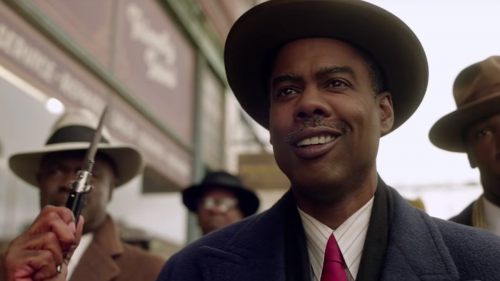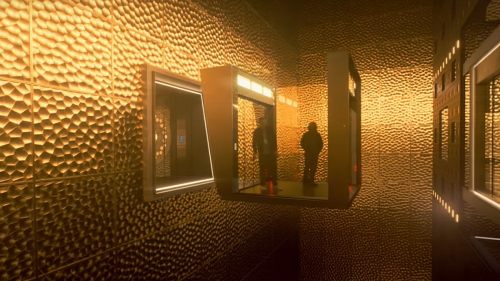LEGION Review: “Chapter 15”
If you’ve been impatient with Legion, the good news is that the plot is back. “Chapter 15” knots together former loose ends in this season’s battle between David Haller and the Shadow King, forming, if not a narrative tapestry, at least a rough rope that binds together much of what we’ve seen in the season’s previous six episodes.
If you haven’t been impatient with Legion, the good news is that “Chapter 15” maintains the tone of the rest of this season; it just packs a lot more into the hour. That includes some of the show’s most memorable images, and some notably bizarre/freaky Vermillion moments, which for Legion is no small feat.
Let’s begin with the Narrator, who offers up his eighth lesson, about “moral panic,” which arises due to a perceived threat in a public space. Emphasis there on “perceived,” as a rational concern becomes irrational fear. This concept builds on all the Narrator’s previous lessons, folding in points about our susceptibility to suggestion, our tendency to build our own realities, and to generate ideas that spread amongst people, even to the extent of creating physical conditions that have no rational reason to exist.
This episode shows what happens when a panic takes hold in Division 3. But what if the public space in which moral panic takes hold is just one person? David Haller’s alter-ego is “Legion,” after all. We saw last week how his understanding of choice as a creation point for endless alternate lives might make David perpetually aware of an entire galaxy of alternate existences – effectively he is that galaxy.
Moral panic in our own public space can be powerful. In addition to what we explicitly see this hour, the episode alludes to fear about the influence of comic books (hooray for those mocked-up EC Comics covers, especially after I name-dropped the publisher a couple weeks ago) and witches and even modern politics. So what if David manifests a real and, as the Narrator suggests, “excessive” response to an unfounded fear?
Problems, that’s what. Big ones.
In this season’s second episode, Future Syd told David that Amahl Farouk wasn’t the big world-ending danger in her timeline. In fact, Farouk could be an ally against that danger. When writing about that episode I wondered if David might be the danger she alluded to.
This week we learn that, yep, David is the danger, the villain, if you will, at least in Future Syd’s timeline. (Which, admittedly, is one of many potential futures.) These beans are spilled in an ingenious manner, as Farouk builds his own version of David’s isolation tank in order to speak to Future Syd, who gives Farouk an image of the villain.
Or so it seems. Earlier in the episode Farouk stages a minor play to undermine David’s sense of stability. The Shadow King tries to mold David’s old resentments against Amy – the sort of feelings one sibling might feel for another in any normal scenario, not to mention one as fraught as David’s life – into weapons that can damage the sense of identity David gets from even Amy’s memory.
Farouk was inside David as he dealt with some of those feelings, and knows just how to push David’s buttons – and yet David resists. That particular delusion doesn’t seem to take hold.
But here’s a question: what if Future Syd is manipulating Farouk in the same way? She “lets slip” that David is the villain, which triggers Farouk’s own past feelings of victimization, not to mention his general sense of superiority. If it’s a ploy to nudge Farouk’s behavior it might be a good one. I’ve already spent weeks wondering how much of a game she’s playing with David.
(Such manipulations are a major theme this week. Over in her cell, Lenny is confronted by Syd, and takes the opportunity to seed Syd with some unease of her own. Syd might not be having it any more than David is taking Farouk’s bait.)
Future Syd sure is glitchy, though. I don’t know if that’s instability or dishonesty, or something else. There are touching moments between David and Syd, and David and Future Syd, as the show’s main mutant tries to define what his relationship is with the same woman in two different timelines. But still we don’t know exactly who to trust. More importantly, David might not know who to trust. Is his own moral panic in the offing?
And that’s all just the A plot.
Elsewhere in Division 3, an insanity monster roams the halls. The massive beast is born out of the infected Ptonomy, who has dropped enough eggs around the installation to infect seemingly everyone but David. (He does this to the tune of ‘Mi Mujer,’ by Nicolas Jaar.) One image, of a corridor littered with broken eggshells, each one birthing a bad idea, is one of the more chilling shots this season. The infected crew nearly destroys Fukyama, but David actually saves the day, in an unusually constrained and effective demonstration of power.
David’s showdown with the giant monster, a delusion grown to full-on insanity, is a Doctor Strange-style confrontation that skips fight scene histrionics in favor of simple and effective ideas. The big point of this confrontation is David’s ability to focus, but he also differentiates the black-tar delusion bugs from the Shadow King’s tactics. Whether we’ll find out where the delusions come from is open to question. (Who’ll be surprised if it is actually David? Not me.) Visually, the sequence is also cool as hell, as it applies the “sparse figures on solid background” style of some of the Narrator’s lessons to in-story action.
The ease with which David literally squashes the madness mutiny in Division 3 is almost unnerving. He’s able to see the danger so clearly, so quickly. One could almost mistake all the buildup of the delusion bug concept as a big whiff.
It is almost certainly not a big whiff. The concept could also be a diversion, both for us and for David. A minor win, maybe a confidence builder. But Ptonomy is still computerized and there’s that woman in the rocking chair, who otherwise seems to be visible only to Fukyama. I’m really into the “Darth Vader in Empire” imagery of Fukyama’s basket being removed, by the way, especially as it plays into the delusion of him as a villain. Then again the whole point is that we don’t know who is a villain. We’ve got a lot to learn about Fukyama, and that’s probably going to start next week.
As a last point, I’m intrigued by something in Farouk’s conversation with Future Syd. He says “I am the State,” after noting that the property of an individual reverts back to the State after the individual dies without an heir. What if that “property” is something less tangible, like power, or an idea? That conversation is a centerpiece of this episode and is very likely going to be the most important aspect of this hour, as flashy as much of the rest of this hour was.



